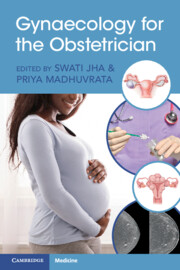Book contents
- Gynaecology for the Obstetrician
- Gynaecology for the Obstetrician
- Copyright page
- Dedication
- Contents
- Contributors
- Foreword
- Preface
- Chapter 1 Ovarian Cysts in Pregnancy
- Chapter 2 Fibroids in Pregnancy
- Chapter 3 Cervical Abnormalities in Pregnancy
- Chapter 4 Vulval Disorders in Pregnancy
- Chapter 5 Congenital Uterine Malformations and Vaginal Anomalies
- Chapter 6 Vaginal Prolapse and Previous Prolapse Surgery
- Chapter 7 Urinary Tract Problems in Pregnancy
- Chapter 8 Previous Third and Fourth Degree Tears
- Chapter 9 Management of Post-Partum Retained Placental Remnants
- Chapter 10 Gestational Trophoblastic Disease (GTD)
- Chapter 11 Female Genital Mutilation
- Chapter 12 Ovarian and Cervical Malignancy in Pregnancy
- Chapter 13 Post-Partum Contraception
- Chapter 14 Pregnancy Associated Breast Cancer
- Index
- References
Chapter 8 - Previous Third and Fourth Degree Tears
Published online by Cambridge University Press: 14 July 2023
- Gynaecology for the Obstetrician
- Gynaecology for the Obstetrician
- Copyright page
- Dedication
- Contents
- Contributors
- Foreword
- Preface
- Chapter 1 Ovarian Cysts in Pregnancy
- Chapter 2 Fibroids in Pregnancy
- Chapter 3 Cervical Abnormalities in Pregnancy
- Chapter 4 Vulval Disorders in Pregnancy
- Chapter 5 Congenital Uterine Malformations and Vaginal Anomalies
- Chapter 6 Vaginal Prolapse and Previous Prolapse Surgery
- Chapter 7 Urinary Tract Problems in Pregnancy
- Chapter 8 Previous Third and Fourth Degree Tears
- Chapter 9 Management of Post-Partum Retained Placental Remnants
- Chapter 10 Gestational Trophoblastic Disease (GTD)
- Chapter 11 Female Genital Mutilation
- Chapter 12 Ovarian and Cervical Malignancy in Pregnancy
- Chapter 13 Post-Partum Contraception
- Chapter 14 Pregnancy Associated Breast Cancer
- Index
- References
Summary
Consequences of obstetric anal sphincter injuries (OASIs) such as anal incontinence can lead to long-term physical and psychological sequelae. As OASIs occur more frequently in nulliparous women, women will probably present in a subsequent pregnancy. A subsequent delivery can increase the risk of developing or deteriorating anal incontinence symptoms. Therefore, counselling and mode of delivery recommendations should occur in the antenatal period to allow women to make an informed choice about their subsequent delivery. Intrapartum, obstetric practice can be adapted by clinicians, taking into account modifiable risk factors associated with repeat OASIs. However, approaches to prevention of sequelae such as anal incontinence in the long term remains unclear. Conservative options such as pelvic floor muscle training should be encouraged and in cases of intractable symptoms, surgical options are available but these should usually be considered in women who have completed their family.
Keywords
- Type
- Chapter
- Information
- Gynaecology for the Obstetrician , pp. 72 - 82Publisher: Cambridge University PressPrint publication year: 2023

